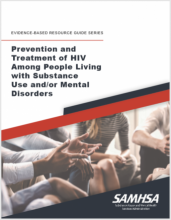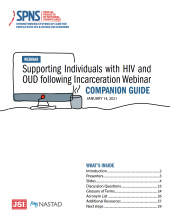
Language is foundational to how we understand and interact with ourselves and others. Unclear language can lead to confusion and inefficiencies, while stigmatizing and prejudicial language leads to harmful practices and dehumanizes people.



Language is foundational to how we understand and interact with ourselves and others. Unclear language can lead to confusion and inefficiencies, while stigmatizing and prejudicial language leads to harmful practices and dehumanizes people.
Building on last month’s episode about providing HIV and substance use care for people who are incarcerated, this month the Boston Medical Center Team talks with Dr.
Navigating the HIV and substance use systems of care presents a number of unique challenges, many of which can become more complex depending on a person’s housing, employment, mental health, or economic situation.
This package is a learning tool designed for health departments and community-based organizations newly offering syringe services programs (SSPs) with the purpose of indexing the materials needed for safer injection, what to offer at a syringe services program, and how to explain what materials a
Transgender people and communities, including nonbinary people, have specific needs within harm reduction programs.
There are so many factors that impact adherence and health outcomes. During this Connecting Care podcast, Drs. Alex Walley, Jessica Taylor, and Sim Kimmel discuss HIV prevention and treatment among people who inject drugs.
COVID-19 has changed the way society operates in countless ways. During our inaugural podcast, our team of addiction specialists and HIV providers, Drs.
This webinar companion guide provides information for the January 2021 Strengthening Systems of Care: Supporting People with HIV and Opioid Use Disorder following Incarceration webinar.
This technical package, a collaborative effort between CDC and NASTAD, provides a broad framework as well as evidence-informed strategies and approaches to support the planning, design, implementation, and sustainability of new and existing syringe services programs (SSPs).